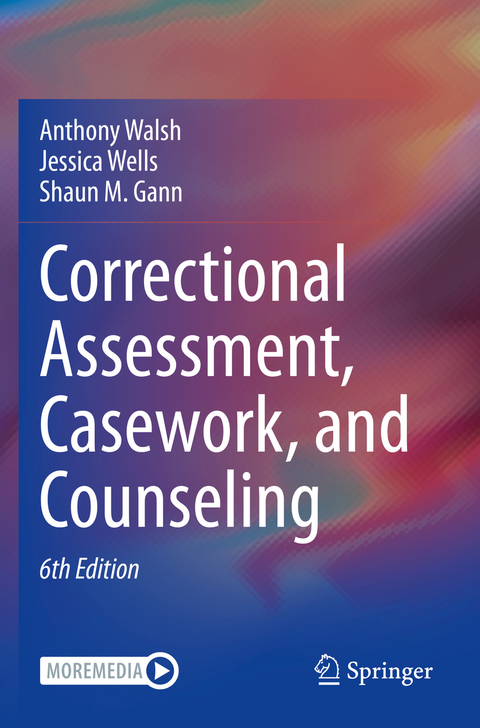
Correctional Assessment, Casework, and Counseling
Springer International Publishing (Verlag)
978-3-030-55228-2 (ISBN)
This book combines the latest in sociology, psychology, and biology to present evidence-based research on what works in community and institutional corrections. It spans from the theoretical underpinning of correctional counseling to concrete examples and tools necessary for professionals in the field.
This book equips readers with the ability to understand what we should do, why we should do it, and tools for how to do it in the field. It discusses interviewing, interrogating, and theories of directive and nondirective counseling, including group counseling. It discusses the strengths and weaknesses of various correctional approaches such as cognitive-behavioral therapies, group counseling, and therapeutic communities. It introduces ethical and legal considerations for correctional professionals.
With an explanation of the presentence investigation report, case management, and appendices containing a variety of classification and assessment instruments, this volume provides practical, hands-on experience. Students of criminal justice, psychology and social work will gain an understanding of the unique challenges to correctional success and practical applications of their studies.
"This book is a teacher/student/practitioner's dream. Grounded in theory and evidence-based research on best practices, it is accessible, well-written, filled with sound insights and tools for working with criminal justice clients. I have used and loved each new edition of this fine text." - Dorothy S. McClellan, Texas A&M University-Corpus Christi
lt;p>Anthony Walsh is a professor emeritus at Boise State University. He received his Ph.D. from Bowling Green State University in 1983. He has published widely in the fields of criminal justice and corrections in peer-reviewed articles, book and encyclopedia chapters, and a number of widely adopted textbooks, as well as 35 other books. Not only has he researched various topics in corrections, as a former probation/parole officer in Ohio for 6 years, he has had extensive training and field experience applying the information described in this book. He also worked as a police officer in England and as a reserve officer in Idaho. He is a member of the New York Academy of Sciences, the American Society of Criminology, and the Biosocial Criminology Association. He was awarded the lifetime achievement award by the Biosocial Criminology Association in 2014, and the lifetime achievement award by the Biopsychosocial section of the American Society of Criminology in 2019.
Jessica Wells is an assistant professor of criminal justice at Boise State University. She received her Ph. D. in Criminal Justice and Criminology from Sam Houston State University in 2017. Her research is in the area of psychological and biosocial perspectives on criminal offending. Her publications focus on the consequences of stress and trauma exposure in samples of community members, incarcerated individuals, and officers working in correctional settings. She teaches courses in criminological theories, research methods, communities and crime, and gender among others. She is a member of the American Society of Criminology, the Western Association of Criminal Justice, and the International Association of Crime Analysts.
Chapter 1 . Introduction.- Chapter 2. The Self: Principal Tool Of The Correctional Helper .- Chapter 3. Interviewing and Interrogating.- Chapter 4. The Presentence Investigation Report.- Chapter 5. Assessment Tools and Guidelines In Community Corrections.- Chapter 6. Assessment and Classification In Institutional Corrections.- Chapter 7. Nondirective Counseling: Theory and Practice.- Chapter 8. Directive Counseling: Theory and Practice.- Chapter 9. Cognitive- Behavioral Approaches.- Chapter 10. Group Counselling In Institutional Settings.- Chapter 11. Using Community Agencies and Volunteers In Case Management.- Chapter 12. Therapeutic Communities In Correctional Institutions.- Chapter 13. Legal Aspects Of Casework And Counseling.- Chapter 14. Alcohol And The Criminal Offender.- Chapter 15. Illegal Drugs And The Criminal Offender.- Chapter 16. The Sex Offender.- Chapter 17. Mentally Ill And Menatally Deficient Offenders.- Chapter 18. The Juvenile Delinquent.-Chapter 19. The Female Offender.- Chapter 20. The Elderly Offender.
| Erscheinungsdatum | 13.11.2021 |
|---|---|
| Zusatzinfo | XIX, 510 p. 96 illus., 6 illus. in color. |
| Verlagsort | Cham |
| Sprache | englisch |
| Maße | 155 x 235 mm |
| Gewicht | 807 g |
| Themenwelt | Geisteswissenschaften ► Psychologie ► Test in der Psychologie |
| Medizin / Pharmazie ► Medizinische Fachgebiete ► Psychiatrie / Psychotherapie | |
| Recht / Steuern ► Strafrecht ► Kriminologie | |
| Schlagworte | cognitive therapy • correctional assessment • correctional counseling • correctional management • offender rehabilitation |
| ISBN-10 | 3-030-55228-4 / 3030552284 |
| ISBN-13 | 978-3-030-55228-2 / 9783030552282 |
| Zustand | Neuware |
| Haben Sie eine Frage zum Produkt? |
aus dem Bereich


